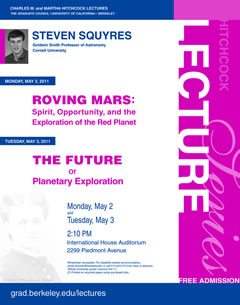
Steven Squyres
Goldwin Smith Professor of Astronomy, Cornell University
Charles M. and Martha Hitchcock Lectures
May 3, 2011 — 2:10 PMInternational House Auditorium — 2299 Piedmont Avenue, Berkeley
About The Lecture The second lecture will discuss the future of solar system exploration. There will be particular emphasis on the results of the National Research Council’s recent planetary decadal survey, which lays out a ten-year plan for planetary exploration. … Continued
International House Auditorium - 2299 Piedmont Avenue, Berkeley Berkeley Graduate Lectures [email protected] false MM/DD/YYYYAbout The Lecture
The second lecture will discuss the future of solar system exploration. There will be particular emphasis on the results of the National Research Council’s recent planetary decadal survey, which lays out a ten-year plan for planetary exploration.
About Steven Squyres
Steven Squyres is best known for his studies of the history and distribution of water on Mars and the possible existence and habitability of a liquid water ocean on Europa, one of Jupiter’s moons. His research focuses on planetary sciences, with particular interest on the robotic exploration of planetary surfaces, geophysics and tectonics of icy satellites, tectonics of Venus, and planetary gamma-ray and x-ray spectroscopy. Former Chair of the NASA Space Science Advisory Committee, Squyres has participated in a number of NASA’s planetary spaceflight missions, including the Voyager mission to Jupiter and Saturn, the Magellan mission to Venus, and the Near Earth Asteroid Rendezvous mission. Spearheading a team of over 3,000 people, Squyres was the principle scientist behind the $800 million Mars Exploration Rover Project (MER). He dreamed up the mission of exploring the Red Planet in 1987, and turned it into a reality by successfully landing the Rovers on Mars’s surface in 2004. In his 2005 book, Roving Mars: Spirit, Opportunity and the Exploration of the Red Planet, Squyres presents an in-depth look at managing one of the most remarkable space missions of our time.